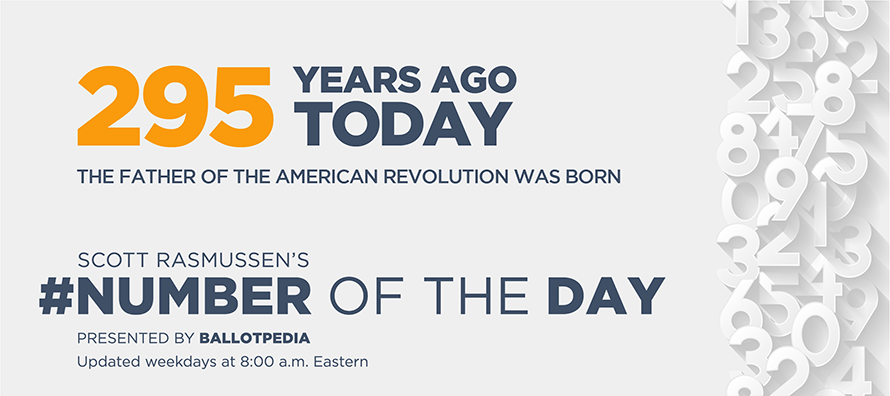Scott Rasmussen's Number of the Day for September 27, 2017
The Number of the Day columns published on Ballotpedia reflect the views of the author.
September 27, 2017: Sam Adams, born 295 years ago today, was the first notable figure to call for American independence from England. In fact, molding a consensus for independence could easily be considered his life’s work.[1] “In the critical prewar years, it was Adams who mapped out what became known as American values about liberty, self-government, and natural human rights.”
Recognizing the power of a noble vision, Adams created what we might call a messaging machine or War Room through the Committees of Correspondence and his own personal efforts. Drawing upon the rich tradition of freedom and self-governance dating back to Magna Carta, Adams “helped unite the colonies [and] implanted a reverence and stoked the love of liberty based on individual rights.”[1]
Though his name is now recognized more as a beer brand than as the Father of the American Revolution, Adams was a pivotal figure in the creation of our nation. Award-winning author Mark Puls believes, “It is unlikely that the break with England in 1776 would have occurred without him.”[1]
In fact, when the British marched on Lexington and Concord, they were hoping to capture Adams and his colleague John Hancock. That march, of course, led to the “Shot Heard ‘Round the World” and the War for Independence.
In 1775, Adams was a target because he had been a thorn in the British side for more than a decade. While many colonists challenged the distant government in London, Puls noted that Adams was special because he “possessed a rare political genius.”[1]
That genius first became evident when Adams became the chief agitator opposing the Stamp Act. At the time, Ben Franklin was in London assuring the British that the tax would be accepted by the colonies. Instead, Adams developed a potent new political weapon by engineering boycotts against the British (before the term boycott even existed). This tactic ultimately led to the 1773 Boston Tea Party, but right from the start it had the practical effect of getting British merchants to side with the colonists in their disputes with the Crown.[1]
Two centuries after Adams’ innovative approach, Martin Luther King Jr. used similar tactics to move our nation forward during the Civil Rights Movement. King, like Adams, had the unique ability to lift up a vision calling our nation to its high ideals while at the same time developing practical tactics to draw us closer to those ideals.
So why isn’t Sam Adams better known today?
Partly, it’s because he intentionally destroyed much of his personal correspondence, leaving historians less of a written record to consider. Adams did so to protect his colleagues. He knew all too well that the British would go after anyone thought to be close to him. Additionally, Adams was a bit older than the generation of founders who became legends. He was the troublemaking outsider who helped spur the move for independence. After independence had been won, George Washington, John Adams, and Thomas Jefferson became the first presidents of the new government.
While Adams trusted the general public more than the political elites of his day, he believed that only the diligence of the people could preserve the liberty he cherished for the nation. And he recognized it would be shameful for any generation to sacrifice the freedom that is their heritage.
“The liberties of our country, the freedoms of our civil Constitution are worth defending at all hazards; it is our duty to defend them against all attacks. We have received them as a fair inheritance from our worthy ancestors. They purchased them for us with toil and danger and expense of treasure and blood. It will bring a mark of everlasting infamy on the present generation – enlightened as it is – if we should suffer them to be wrested from us by violence without a struggle, or to be cheated out of them by the artifices of designing men.”
Each weekday, Scott Rasmussen’s Number of the Day explores interesting and newsworthy topics at the intersection of culture, politics, and technology.
- September 26, 2017 – 65 noteworthy endorsements in Alabama Senate primary
- September 25, 2017 – 8 years ago today, protests erupted against the proposed bank bailouts
- September 22, 2017 – 48% of Democrats call themselves liberal
- September 21, 2017 – 50% of millennials would give up voting to have student loans forgiven
- September 20, 2017 – 1,597 bank branches closed by Bank of America since 2009
- To see other recent numbers, check out the archive.
Scott Rasmussen’s Number of the Day is published by Ballotpedia weekdays at 8:00 a.m. Eastern. Click here to check out the latest update.
The Number of the Day is broadcast on local stations across the country. An archive of these broadcasts can be found here.
Columns published on Ballotpedia reflect the views of the author.
Ballotpedia is the nonprofit, nonpartisan Encyclopedia of American Politics.
See also
Footnotes
| |||||||||||||||||||||||



